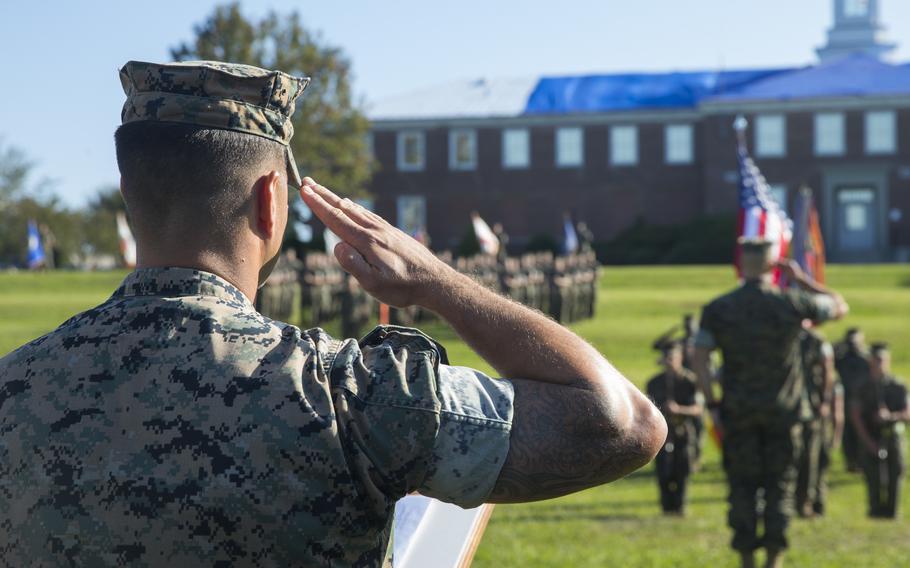
U.S. Marines from 3rd Battalion, 6th Marine Regiment, 2nd Marine Division salute during the National Anthem while participating in a change of command ceremony at Camp Lejeune, North Carolina, Sept. 20, 2019. (Patrick King/U.S. Marine Corps)
The United States military has long been a cornerstone of our nation’s strength, embodying values that have preserved our freedoms and secured our place on the global stage. Among these values, meritocracy stands out as a defining principle. In the military, individuals rise based on ability, performance and leadership — not on political connections, personal wealth or arbitrary criteria.
However, this foundational tenet is increasingly under threat as partisan politics and societal pressures encroach on the institution’s independence and operational effectiveness. Now more than ever we must strengthen and preserve our military meritocratic structure to resist politicization and safeguard its ability to fulfill its mission.
Meritocracy in the military ensures that the best and brightest rise to positions of leadership. From rank-and-file soldiers to the highest echelon of command, the emphasis on competence over favoritism or ideology has been instrumental in building an institution that commands respect, both domestically and internationally.
Leaders like Gen. Dwight D. Eisenhower and Adm. Chester Nimitz were not chosen for their political affiliations, but for their exceptional ability to lead troops and strategize in times of war. Their success highlighted the importance of maintaining a system where capability is the sole determinant of advancement. Yet recent trends threaten this time-tested model.
The growing polarization of American society has seeped into institutions traditionally shielded from political interference, and the military is no exception. Attempts to inject partisan agendas into military policy — whether through the imposition of ideological litmus tests or the politicization of senior appointments — risk undermining the trust and cohesion that are vital to the armed forces. This erosion of meritocracy not only compromises operational effectiveness but also endangers the nonpartisan reputation of the military, a quality essential to its role in a democratic society.
Moreover, societal debates over diversity and inclusion have created additional challenges while the military has historically been a leader in advancing integration and equality from the desegregation of the forces under President Harry S. Truman to the repeal of “don’t ask, don’t tell” — such progress has always been guided by balance between fairness and operational readiness.
Ensuring opportunities for all who are qualified to serve strengthens the military ranks, but imposing quotas or prioritizing demographic characteristics over merit undermine the very principles that have made the U.S. military a global leader. Diversity achieved through meritocracy enhances unity and effectiveness; diversity achieved at the expense of competence weakens both. The consequences of colonization and the erosion of meritocracy are far reaching.
First, the risk of alienating the rank and file, who expect promotions and assignments to be based on skill and dedication rather than political expediency. Second, it could lead to a decline in public trust. The American people have long held the military in high regard precisely because it is seen as an institution above politics. Allowing partisan influences to dictate policy or personnel decisions will tarnish that perception and diminish the military standing. Additionally, politicization could weaken our strategic position on a global stage.
Adversaries like China and Russia closely monitor the internal dynamics of U.S. institutions. Signs of division or dysfunction within the military provide them with opportunities to exploit vulnerability. A politicized military is less capable of responding to threats, whether they come in the form of a conventional warfare, cyberattacks or hybrid conflicts.
To address these challenges, several steps are necessary. First, we must reinforce the military commitment to an apolitical service. Senior leaders must publicly and consistently affirm the importance of neutrality, ensuring that personal political beliefs do not influence decision making or the perception of the armed forces. This includes safeguarding the integrity of military education and training programs, which should emphasize leadership, ethics and operational excellence over ideological indoctrination.
Second, Congress and the executive branch must exercise restraint in using the military as a tool for partisan gain. This includes avoiding politically motivated appointments and ensuring that policies affecting the forces are guided by strategic and operational considerations rather than a short-term political agenda. Oversight mechanism should be strengthened to prevent undue influence and ensure accountability.
Third, the military must continue to adapt to societal changes while preserving its meritocratic core. This means maintaining rigorous standards for recruitment, training and promotion that prioritize competence and performance. Initiatives to enhance diversity should be pursued in ways that align with the standards, ensuring that all who serve are held to the same high expectations.
Finally public awareness and engagement are crucial. The American public plays a vital role in holding leaders accountable and advocating for the preservation of the military’s core values. Civic education should emphasize the importance of a nonpartisan military and the dangers of politicization, fostering a culture of respect and support for those who serve.
The stakes could not be higher. As global challenges grow more complex and domestic divisions deepen, the United States must rely on a military that is unified, capable and above reproach. Preserving the military meritocracy is not just a matter of institutional integrity: it is a matter of national security.
By recommitting to the principles that have long defined our armed forces, we can ensure that they remain a beacon of excellence and a bulwark against the forces that threaten our democracy.
Richard H. Carmona, M.D., M.P.H., FACS, a combat medic in Vietnam, was the 17th surgeon general of the United States.